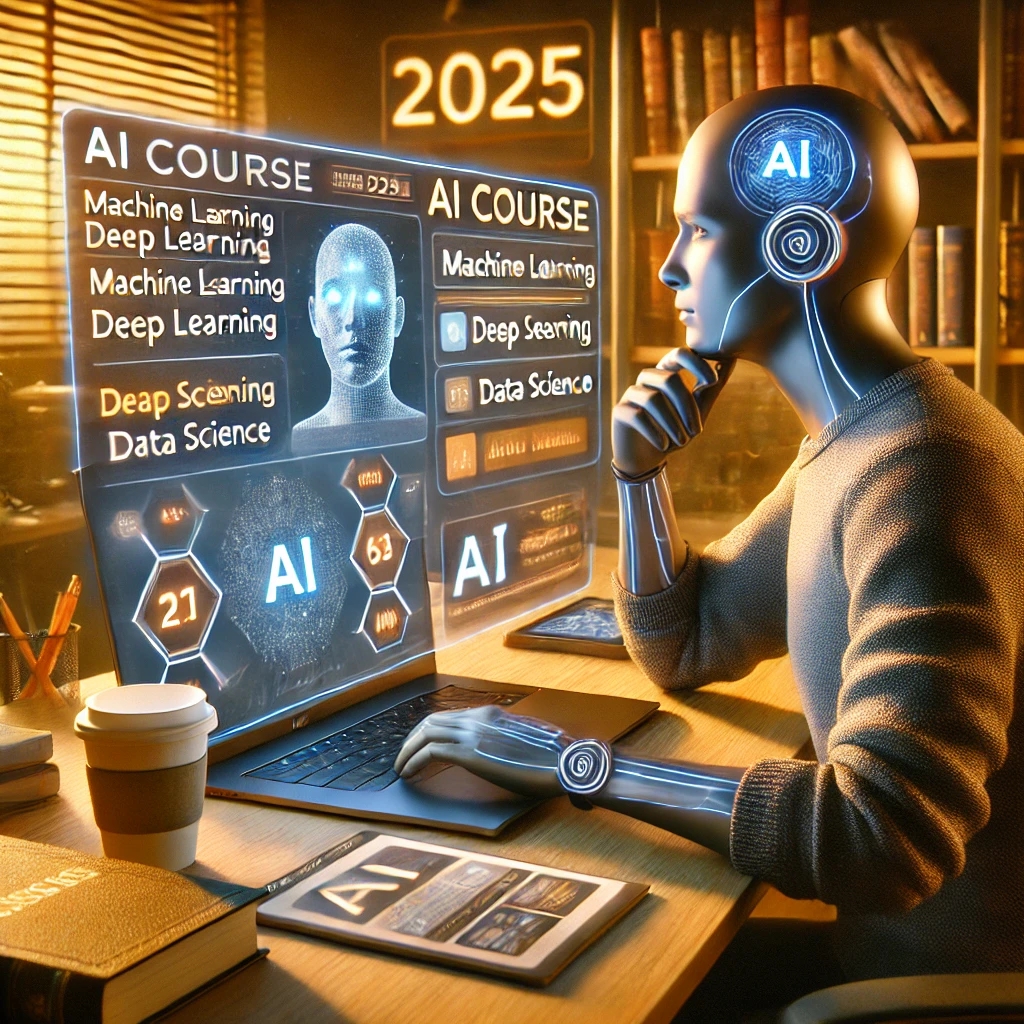Best AI Tools & Courses to Master AI in 2025
Discovering the perfect courses to master AI in 2025 has become increasingly crucial as artificial intelligence reshapes our professional landscape. The transformative power of AI education extends far beyond traditional tech roles, creating unprecedented opportunities for career growth and innovation. As someone who has extensively researched and experienced various AI learning pathways, I can confidently guide you through the most effective courses available today.
With artificial intelligence becoming increasingly integrated into every industry, from healthcare to finance, the demand for AI expertise has reached unprecedented levels. According to recent studies by Deloitte, nearly 70% of executives report significant gaps in AI-related skills within their organizations. This skills gap represents a golden opportunity for professionals willing to invest time in mastering AI technologies and applications.
The challenge many face isn’t the lack of learning resources but rather navigating through the overwhelming array of options available. Some courses promise quick mastery but deliver surface-level knowledge, while others require significant financial investment without guaranteeing practical skills. Through careful analysis and personal experience, I’ve identified the most valuable and accessible courses that truly deliver on their promises.
We strongly recommend that you check out our guide on how to take advantage of AI in today’s passive income economy.
Table of Contents
Why Learning AI Matters in 2025
The landscape of artificial intelligence has evolved dramatically, creating an unprecedented demand for skilled professionals across industries. Recent data shows that AI engineers command impressive salaries, with average compensation reaching $133,000 annually in the United States. Machine Learning Engineers and Data Scientists earn even more, with average salaries of $160,673 and $159,748 respectively.
Beyond the financial benefits, mastering AI opens doors to innovative problem-solving opportunities and career advancement. The field’s rapid evolution means that early adopters of AI education position themselves advantageously in an increasingly competitive job market. Whether you’re aiming to transition into a tech role or enhance your current position, understanding AI has become as essential as computer literacy was in the previous decade.
[## Google’s Introduction to Generative AI Learning Path
Among the most innovative courses to master AI in 2025, Google’s learning path stands as a testament to practical education in artificial intelligence. This comprehensive program combines theoretical knowledge with hands-on experience, delivering content through an engaging mix of interactive lessons and practical exercises. The course structure thoughtfully progresses from foundational concepts to advanced applications, making it particularly valuable for those new to the field of artificial intelligence.
The learning path’s strength lies in its focus on generative AI, currently one of the most dynamic and promising areas in artificial intelligence. Students engage with real-world applications of large language models, exploring their practical implementations across various industries. The course’s emphasis on ethical considerations and responsible AI usage ensures learners develop a well-rounded understanding of both technical capabilities and social implications.
HubSpot’s AI for Marketing Course
Marketing professionals seeking to master AI in 2025 will find particular value in HubSpot’s specialized course. This program bridges the gap between traditional marketing strategies and artificial intelligence applications, offering practical insights into AI-driven marketing optimization. The course structure effectively combines theoretical understanding with immediate practical application, allowing marketers to implement AI solutions in their daily operations.
Through six carefully crafted video lessons, learners explore various aspects of AI-enhanced marketing, from content generation to data analysis. The course excels in demonstrating how artificial intelligence can augment human creativity rather than replace it, providing concrete examples of successful AI integration in marketing campaigns. The practical focus on prompt engineering and content optimization makes this course particularly valuable for content creators and marketing strategists.
Professional Certification Pathways
For those committed to achieving recognized credentials as they master AI in 2025, several certification programs offer comprehensive education in artificial intelligence. These structured learning paths combine theoretical knowledge with practical applications, often culminating in industry-recognized certifications that can significantly enhance career prospects.
LinkedIn’s Applying Generative AI as a Business Professional
This certification program stands out for its practical approach to artificial intelligence implementation in business contexts. The course structure effectively balances theoretical understanding with real-world applications, making it particularly valuable for professionals seeking to integrate AI into their organizations. Through carefully designed modules, learners develop proficiency in leveraging AI tools for business optimization and innovation.
Udemy’s Artificial Intelligence A-Z™
This comprehensive program offers an intensive journey through artificial intelligence fundamentals and advanced applications. The course’s strength lies in its practical approach, guiding learners through the creation of multiple AI models while building a solid theoretical foundation. Regular updates ensure the content remains relevant in the rapidly evolving field of artificial intelligence.
Practical Learning Strategies
Success in mastering AI requires more than just selecting the right courses. Effective learning strategies play a crucial role in developing lasting proficiency in artificial intelligence. The following approaches have proven particularly effective for learners at various skill levels.
Project-Based Learning
Implementing practical projects remains one of the most effective ways to master AI in 2025. By working on real-world applications, learners develop a deeper understanding of artificial intelligence concepts while building a portfolio of demonstrable skills. Projects should progress from simple applications to more complex implementations, allowing for gradual skill development.
Community Engagement
Participating in AI learning communities provides invaluable support and networking opportunities. These communities offer platforms for knowledge sharing, problem-solving, and collaborative learning. Regular interaction with fellow learners and experienced practitioners enhances understanding and keeps motivation high throughout the learning journey.
Industry Applications and Career Paths
Understanding how artificial intelligence applies across different industries helps learners focus their studies effectively. Various sectors now require AI expertise, each offering unique career opportunities and challenges. Healthcare organizations increasingly seek professionals who can implement AI in diagnostic systems and patient care optimization. Financial institutions require experts in AI-driven risk assessment and fraud detection. Manufacturing companies need specialists who can develop AI solutions for process automation and quality control.
Emerging Trends in AI Education
The landscape of AI education continues to evolve rapidly, with new approaches and technologies shaping how we learn. Virtual reality training environments provide immersive learning experiences, allowing students to interact with AI systems in simulated scenarios. Adaptive learning platforms use artificial intelligence to personalize education paths, ensuring optimal learning progression for each student.
Measuring Progress and Success
Tracking progress remains essential when working to master AI in 2025. Effective evaluation methods combine theoretical assessments with practical project outcomes. Portfolio development provides tangible evidence of skill acquisition, while regular self-assessment helps identify areas needing additional focus. Many courses now incorporate AI-driven assessment tools that provide detailed feedback on learning progress.
Free AI Courses to Master Artificial Intelligence
The journey to master AI in 2025 doesn’t necessarily require a significant financial investment. Several prestigious institutions and tech giants offer comprehensive free courses that provide solid foundations in artificial intelligence. These courses combine theoretical knowledge with practical applications, making them perfect starting points for beginners.
AI for Everyone by DeepLearning.AI
This groundbreaking course stands as a testament to accessible AI education, having attracted over 8 million enrollees worldwide. Created by renowned AI expert Dr. Andrew Ng, it demystifies complex AI concepts through clear, engaging instruction. The course excels in bridging the gap between technical concepts and practical business applications, making it particularly valuable for professionals seeking to understand AI’s impact on their industries.
The course structure thoughtfully progresses through fundamental concepts, ensuring learners grasp essential principles before moving to more advanced topics. With approximately 6 hours of content spread across four modules, it offers flexibility for busy professionals while maintaining depth and comprehensiveness. The addition of subtitles in 23 languages further enhances its accessibility, truly making it “AI for Everyone.”
Elements of AI by University of Helsinki
This innovative course represents a unique approach to teaching artificial intelligence, having successfully reached over one million students across 170 countries. Its text-based format, available in 26 languages, breaks down complex AI concepts into digestible segments. The course’s success in attracting female participants, at 40% of enrollment, demonstrates its effectiveness in making AI education more inclusive.
The curriculum thoughtfully balances theoretical understanding with practical applications, ensuring learners develop both conceptual knowledge and hands-on skills. Through carefully designed exercises and real-world examples, students progressively build their understanding of AI fundamentals, problem-solving techniques, and ethical considerations.
Premium AI Learning Pathways
While free courses offer excellent starting points, paid courses often provide additional benefits that can accelerate your journey to master AI in 2025. These programs typically offer more structured learning environments, direct mentorship, and recognized certifications.
Artificial Intelligence A-Z™: Learn How to Build an AI
This comprehensive course stands out for its practical approach to AI education, offering hands-on experience in building seven distinct AI models. Updated in January 2025, it reflects the latest developments in artificial intelligence while maintaining accessibility for beginners. The course’s strength lies in its combination of theoretical knowledge with immediate practical application.
The curriculum progressively builds complexity, starting with foundational concepts before advancing to sophisticated applications like self-driving car AI and medical chatbots. With over 15 hours of content and regular updates, it represents a significant value for aspiring AI professionals. The inclusion of bonus materials covering cutting-edge topics ensures learners stay current with emerging trends.
AI Foundations for Everyone Specialization
IBM’s specialized program offers a unique blend of theoretical knowledge and practical application, particularly valuable for those seeking to understand enterprise-level AI implementation. The course’s structure emphasizes hands-on experience with IBM Watson, allowing learners to create functional AI applications without extensive coding knowledge.
Essential Skills for AI Mastery
To effectively master AI in 2025, certain foundational skills prove invaluable. While not all paths require deep technical expertise, understanding key concepts accelerates learning and enables more effective application of AI technologies.
Mathematical Foundations
A solid grasp of basic mathematics underpins successful AI learning. Focus areas should include statistics, linear algebra, and probability theory. However, many modern courses now offer intuitive explanations that make these concepts accessible to non-technical learners. The key lies in understanding fundamental principles rather than complex mathematical proofs.
Programming Fundamentals
While not all AI roles require extensive coding skills, familiarity with programming concepts enhances understanding and capability. Python has emerged as the preferred language for AI development, offering an excellent balance of simplicity and power. Many courses now incorporate basic programming instruction, making it accessible even for complete beginners.
Future Trends in AI Education
As we progress through 2025, several emerging trends are shaping how we learn and master AI. Generative AI tools have revolutionized the learning process, offering interactive experiences and personalized feedback. Virtual labs and simulation environments increasingly allow learners to experiment with AI systems in safe, controlled settings.
Conclusion
The journey to master AI in 2025 offers numerous pathways, each suited to different learning styles and career goals. Whether choosing free resources like Google’s Learning Path or investing in comprehensive programs like the Wharton AI for Business Specialization, the key lies in matching your learning approach to your professional objectives. The field of artificial intelligence continues to evolve, making now the perfect time to begin your learning journey.

We strongly recommend that you check out our guide on how to take advantage of AI in today’s passive income economy.




